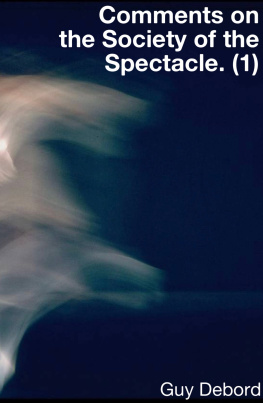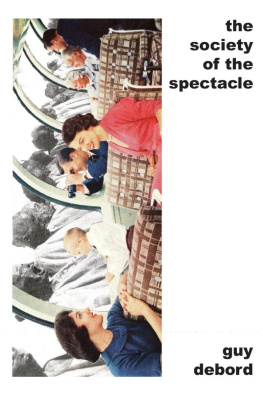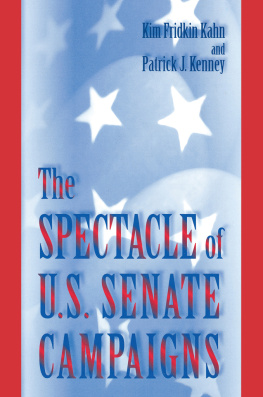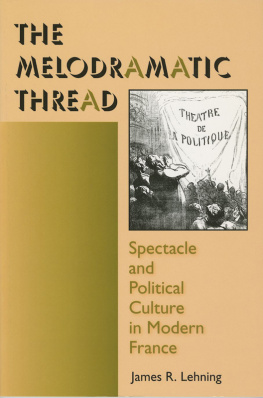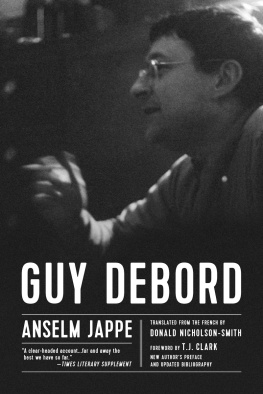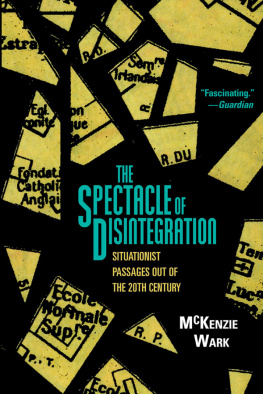Guy Debord - Comments on the Society of the Spectacle
Here you can read online Guy Debord - Comments on the Society of the Spectacle full text of the book (entire story) in english for free. Download pdf and epub, get meaning, cover and reviews about this ebook. year: 1998, publisher: Verso, genre: Politics. Description of the work, (preface) as well as reviews are available. Best literature library LitArk.com created for fans of good reading and offers a wide selection of genres:
Romance novel
Science fiction
Adventure
Detective
Science
History
Home and family
Prose
Art
Politics
Computer
Non-fiction
Religion
Business
Children
Humor
Choose a favorite category and find really read worthwhile books. Enjoy immersion in the world of imagination, feel the emotions of the characters or learn something new for yourself, make an fascinating discovery.
- Book:Comments on the Society of the Spectacle
- Author:
- Publisher:Verso
- Genre:
- Year:1998
- Rating:4 / 5
- Favourites:Add to favourites
- Your mark:
- 80
- 1
- 2
- 3
- 4
- 5
Comments on the Society of the Spectacle: summary, description and annotation
We offer to read an annotation, description, summary or preface (depends on what the author of the book "Comments on the Society of the Spectacle" wrote himself). If you haven't found the necessary information about the book — write in the comments, we will try to find it.
Comments on the Society of the Spectacle — read online for free the complete book (whole text) full work
Below is the text of the book, divided by pages. System saving the place of the last page read, allows you to conveniently read the book "Comments on the Society of the Spectacle" online for free, without having to search again every time where you left off. Put a bookmark, and you can go to the page where you finished reading at any time.
Font size:
Interval:
Bookmark:
Comments on the Society of the Spectacle
Guy Debord, 1988
Preface
In memory of Gerard Lebovici, assassinated in Paris on 5 March 1984, in a trap that remains mysterious.[1]
"However critical the situation and circumstances in which you find yourself, despair of nothing; it is on the occasions in which everything is to be feared that it is necessary to fear nothing; it is when one is surrounded by all the dangers that it is not necessary to dread any; it is when one is without resources that it is necessary to count on all of them; it is when one is surprised that it is necessary to surprise the enemy himself." Sun Tzu, The Art of War
I
These comments are sure to be promptly known by fifty or sixty people; a large number given the times in which we live and the gravity of the matters under discussion. But then, of course, in some circles I am considered to be an authority. It must also be borne in mind that a good half of this elite that will be interested will consist of people who devote themselves to maintaining the spectacular system of domination,[3] and the other half of people who persist in doing quite the opposite. Having, then, to take account of readers who are both attentive and diversely influential, I obviously cannot speak with complete freedom. Above all, I must take care not to instruct just anybody.
The unhappiness of the times thus compels me, once again, to write in a new way. Some elements will be intentionally omitted; and the plan will have to remain rather unclear. Readers will encounter certain lures, like the very hallmark of the era. As long as other pages are interpolated here and there, the overall meaning may appear just as secret clauses have very often been added to whatever treaties may openly stipulate[4]; just as some chemical agents only reveal their hidden properties when they are combined with others. However, in this brief work there will be only too many things which are, alas, easy to understand.
II.
In 1967, in a book entitled The Society of the Spectacle, I showed what the modern spectacle was already in essence: the autocratic reign of the market economy, which had acceded to an irresponsible sovereignty, and the totality of new techniques of government that accompanied this reign. The disturbances of 1968, which in several countries lasted into the following years, having nowhere overthrown the existing organization of the society from which it springs apparently spontaneously, the spectacle has thus continued to reinforce itself, that is, to spread to the furthest limits on all sides, while increasing its density in the center. It has even learned new defensive techniques, as powers under attack always do. When I began the critique of spectacular society, what was particularly noticed -- given the period -- was the revolutionary content that could be discovered in that critique; and it was naturally felt to be its most troublesome element. As to the spectacle itself, I was sometimes accused of having invented it out of thin air, and was always accused of indulging myself to excess in my evaluation of its depth and unity, and its real workings. I must admit that others who later published new books on the same subject demonstrated that it was quite possible to say less. All they had to do was to replace the totality and its movement by a single static detail on the surface of the phenomenon, with each author demonstrating his originality by choosing a different and all the less disturbing one. No one wanted to taint the scientific modesty of his personal interpretation by interposing reckless historical judgments.
Nonetheless, the society of the spectacle has continued to advance. It moves quickly for in 1967 it had barely forty years behind it, though it had used them to the full. And by its own development, which no one took the trouble to investigate, it has since shown with some astonishing achievements that it is effectively just what I said it was. Proving this point has more than academic value, because it is undoubtedly indispensable to have understood the spectacle's unity and articulation as an active force in order to examine the directions in which this force has since been able to travel. These questions are of great interest, for it is under such conditions that the next stage of the conflict in society will necessarily be played out. Since the spectacle today is certainly more powerful than it was before, what is it doing with this additional power? What point has it reached, that it had not reached previously? What, in short, are its present lines of advance? The vague feeling that there has been a rapid invasion which has forced people to lead their lives in an entirely different way is now widespread; but this is experienced rather like some inexplicable change in the climate, or in some other natural equilibrium, a change about which ignorance knows only that it has nothing to say. What is more, many see it as a civilizing invasion, as something inevitable, and even want to collaborate. Such people would rather not know the precise purpose of this conquest, and how it is advancing.
I am going to outline certain practical consequences, still little known, that result from the spectacle's rapid deployment over the last twenty years. I have no intention of entering into polemics on any aspect of this question; these are now too easy, and too useless. Nor will I try to convince. The present comments are not concerned with moralizing. They do not propose what is desirable, or merely preferable. They simply record what is.
III.
No one today can reasonably doubt the existence or the power of the spectacle; on the contrary, one might doubt whether it is reasonable to add anything on a question which experience has already settled in such draconian fashion. Le Monde of 19 September 1987 offered a felicitous illustration of the saying, 'If it exists, there's no need to talk about it,' a fundamental law of these spectacular times which, at least in this respect, ensure there is no such thing as a backward country.
That modern society is a society of spectacle now goes without saying. It will soon be necessary to remark those who do nothing remarkable. One loses count of all the books describing a phenomenon which now characterizes all the industrialized nations yet equally spares none of the countries which have still to catch up. What is so droll, however, is that all the books which do analyze this phenomenon, usually to deplore it, must sacrifice themselves to the spectacle if they're to become known.
It is true that this spectacular critique of the spectacle, which is not only late but, even worse, seeks 'to make itself known' on the same level, inevitably sticks to vain generalities or hypocritical regrets; just as vain as the clowns who parade their disabused sagacity in newspapers.
The empty debate on the spectacle -- that is, on the activities of the world's owners -- is thus organized by the spectacle itself : everything is said about the extensive means at its disposal, to ensure that nothing is said about their extensive deployment. Rather than talk of the spectacle, people often prefer to use the term 'media.' And by this they mean to describe a mere instrument, a kind of public service which with impartial 'professionalism' would facilitate the new wealth of mass communication through mass media [English in original] -- a form of communication which has at last attained a unilateral purity, whereby decisions already taken are presented for peaceful admiration. For what is communicated are orders ; and with great harmony, those who give them are also those who tell us what they think of them.
The power of the spectacle, which is so fundamentally unitary, a centralizer by the very weight of things, and entirely despotic in spirit, frequently rails at seeing the constitution under its rule of a politics-spectacle, a justice-spectacle, a medicine-spectacle and all the other similarly surprising examples of "mediatic excess." Thus the spectacle would be nothing other than the excesses of the mediatic,[5] whose nature, unquestionably good since it facilitates communication, is sometimes driven to extremes. Often enough society's bosses declare themselves ill-served by their media employees: more often they blame the plebian spectators for the common, almost bestial manner in which they indulge in mediatic pleasures. A virtually infinite number of supposed mediatic differences thus serve to dissimulate what is, on the contrary, the result of a spectacular convergence, pursued with remarkable tenacity. Just as the logic of the commodity reigns over capitalists' competing ambitions, or the logic of war always dominates the frequent modifications in weaponry, so the harsh logic of the spectacle controls the abundant diversity of mediatic extravagances.
Next pageFont size:
Interval:
Bookmark:
Similar books «Comments on the Society of the Spectacle»
Look at similar books to Comments on the Society of the Spectacle. We have selected literature similar in name and meaning in the hope of providing readers with more options to find new, interesting, not yet read works.
Discussion, reviews of the book Comments on the Society of the Spectacle and just readers' own opinions. Leave your comments, write what you think about the work, its meaning or the main characters. Specify what exactly you liked and what you didn't like, and why you think so.

